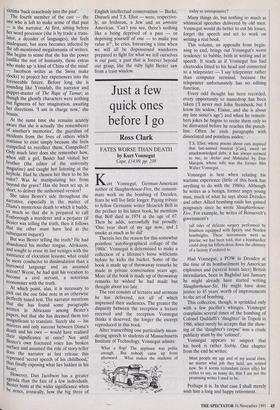Just a few quick ones before I go
Ross Clark
FATES WORSE THAN DEATH by Kurt Vonnegut Cape, £14.99, pp. 239 urt Vonnegut, German-American author of Slaughterhouse-Five, the consum- mate work on the bombing of Dresden, fears he will live little longer. Paying tribute to fellow Germanic writer Heinrich Bi511 in the preface to his latest book, he mentions that Boll died in 1974 at the age of 67. Then he adds, sorrowfully but proudly: 'One year short of my age now, and I smoke as much as he did'.
Therein lies the reason for this somewhat pointless 'autobiographical collage of the 1980s'. Vonnegut is determined to make a collection of a lifetime's loose witticisms before he kicks the bucket. Some of the book is made up of throwaway remarks he made in private conversation years ago. More of the book is made up of throwaway remarks he wished he had made but thought about too late.
The rest consists of lectures and sermons he has delivered, not all of which impressed their audiences. The greater the disparity between the reception a lecture received and the reception Vonnegut thinks it deserved, the longer the excerpt reproduced in this book.
After transcribing one particularly mean- dering speech to students of Massachusetts Institute of Technology, Vonnegut admits:
What a flop! The applause was polite enough. . . But nobody came up front afterward. . . What makes the students of today so unresponsive?
Many things do, but nothing so much as whimsical speeches delivered by old men. Vonnegut would do better to cut his losses, forget the speech and set to work on writing a real book.
This volume, an appendix from begin- ning to end, brings out Vonnegut's worst tendency: to babble, both in writing and in speech. It reads as if Vonnegut has had electrodes fitted to his head and connected to a teleprinter — I say teleprinter rather than computer terminal, because the teleprinter unfortunately has no editing function.
Every odd thought has been recorded, every opportunity to namedrop has been taken (`I never met John Steinbeck, but I know his widow, Elaine, and she is about my late sister's age') and when he remem- bers jokes he begins to recite them only to be distracted before he reaches the punch- line. Often he ends paragraphs with dissociated and pointless asides:
T.S. Eliot, whose poems about cats inspired that last-named musical [Cats], owed an unacknowledged debt, it has always seemed to me, to Archie and Mehitabel by Don Marquis, whose wife was the former Mrs Walter Vonnegut.
Vonnegut is best when relating his wartime experience (little of this book has anything to do with the 1980s). Although he writes as a benign, former angry young man, much of what he says about Dresden and other Allied bombing raids has gained poignancy since he wrote Slaughterhouse- Five. For example, he writes of Roosevelt's government's tall tales of delicate surgery performed by bombers equipped with Sperry and Norden bombsights. These instruments were so precise, we had been told, that a bombardier could drop his billets-doux down the chimney of a factory if ordered to.
Had Vonnegut, a POW in Dresden at the time of its bombardment by American explosives and (several hours later) British incendiaries, been in Baghdad last January he might already have started writing Slaughterhouse-Six. He might have done justice to 45 years' worth of improvements to the art of bombing.
This collection, though, is sprinkled only with a few pacifist's whinges. Vonnegut complains several times of the bombing of Colonel Qaddaffi's 'daughter' in Tripoli in 1986, when surely he accepts that the show- ing of the 'daughter's corpse' was a crude publicity stunt by the 'colonel'.
Vonnegut appears to suspect that his book is rather feeble. One chapter from the end he writes:
Most people my age and of my social class, no matter what job they held, are retired now. So it seems redundant (even silly) for critics to say, as many do, that I am not the promising writer I used to be.
Perhaps it is. In that case I shall merely wish him a long and happy retirement.










































































 Previous page
Previous page